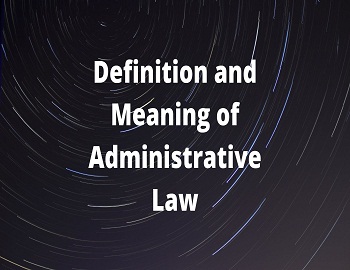Administrative Law:
Wherever there is public administration, there must also be administrative law. Administrative Law is found in every state and it performs the function of regulating the constitution, functions, procedures and processes of administrative authorities. It is a universal, natural and necessary system of law. It is a part of the public law of the country and it creates a pattern of relationship between public authorities and the citizens. Administrative officials are always given discretionary authority in the exercise of their powers. But the use of administrative discretion has not to be arbitrary. The limits of administrative discretion are laid down by law, which is known as Administrative Law. Administrative Law determines the amount of discretion permitted to administrative officers and agencies.
In simple words and in a broad sense, Administrative Law means the whole body of law relating to Public Administration.
According to Ivor Jennings “Administrative Law is the law relating to administration. It determines the organization, powers and duties of administrative authorities and indicates to the individual remedies for the violation of his rights”.
According to F. G. Goodrow “Administrative Law is that part of the public law which fixes the organization and determines the competence of the administrative authorities and indicates to the individual remedies for the violation of his rights”.
According to Barthelemy “Administrative Law is the sum-total of the principles according to which the activity of the services concerned with the execution of the law is exercised”.
W. B. Munro defines Administrative Law “as a system of jurisprudence which on the one hand relieves public officials from amenability of the ordinary courts for acts performed in their official capacity and on the other hand, sets up a special jurisdiction to hold them accountable”. He further elaborates “It deals not only with the liability of the state and its subordinate divisions for injuries done to private individuals or their property but with the rules relating to the validity of administrative decrees, the methods of granting redress when public officials exceed their legal authority, the awarding of damages to private individuals for injuries which result from the faults of the public service, the distinction between official personal acts on the part of public officers and many kindered matters”.
C. F. Strong defines Administrative Law “as the body of rules which regulates the relations of the administrative authority towards private citizens and determines the position of the state officials, the rights and the liabilities of private citizens in their dealings with these officials as representatives of the state and the procedure by which these rights and liabilities are enforced”.
According to Pfiffner, Administrative Law includes-
- The constitution, statues, charters, ordinances and resolutions defining the powers and duties of administrative agencies.
- The rules and regulations made by administrative officers and agencies.
- The decisions and orders issued by administartive officers or agencies.
- The judicial decisions relating to the above three.
Thus in a broad sense, administrative law covers all the statutes, charters, resolutions, rules, regulations, judicial decisions and orders which have a bearing upon the structure of the administrative authorities, the distribution of functions among them, their powers and procedures, their personnel and finance and their responsibility.









Comments (No)